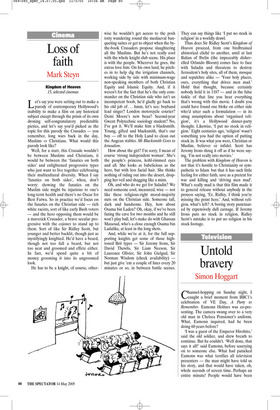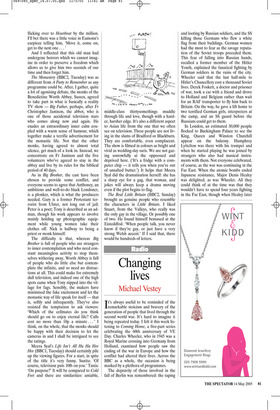Untold bravery
Simon Hoggart
Channel-hopping on Sunday night, I caught a brief moment from BBC1’s celebration of VE Day, A Party to Remember. Eamonn Holmes was co-presenting. The camera swung over to a very old man in Chelsea Pensioner’s uniform. What, Eamonn inquired, had he been doing 60 years before?
‘I was a guest of the Emperor Hirohito,’ said the old soldier, and drew breath to continue. But he couldn’t. ‘Well done, that says it all!’ said Eamonn, before scurrying on to someone else. What had panicked Eamonn was what terrifies all television presenters — the man might have told us his story, and that would have taken, oh, whole seconds of screen time. Perhaps an entire minute! People would have been flicking over to Heartbeat by the million. I’ll bet there was a little voice in Eamonn’s earpiece telling him, ‘Move it, come on, get to the next one ... ’ And I reflected that this old man had undergone horrors which we cannot imagine in order to preserve a freedom which allows us to give him two seconds of our time and then forget him.
The Monastery (BBC2, Tuesday) was as different from A Party to Remember as any programme could be. After, I gather, quite a lot of agonising debate, the monks of the Benedictine Worth Abbey, Sussex, agreed to take part in what is basically a reality TV show — Big Father, perhaps, after Fr Christopher Jamison, the abbot, who is one of those accidental television stars who comes along now and again. He exudes an extraordinary inner calm coupled with a warm sense of humour, which together make a terrific advertisement for the monastic life. Not that the other monks, having agreed to almost total silence, get much of a look in. Instead, we concentrate on Fr Jamison and the five volunteers who’ve agreed to stay in the abbey and live by its rules for the biblical period of 40 days.
As in Big Brother, the cast have been chosen to provide some conflict, and everyone seems to agree that Anthoney, an ambitious and well-to-do black Londoner, is a plonker, which is what the producers needed. Gary is a former Protestant terrorist from Ulster, not long out of jail; Peter is a poet; Tony is described as an adman, though his work appears to involve mainly holding up photographic equipment while young women take their clothes off. Nick is halfway to being a priest or monk himself.
The difficulty is that, whereas Big Brother is full of people who are strangers to inner contemplation and who need constant meaningless activity to stop themselves withering away, Worth Abbey is full of people who do little else but contemplate the infinite, and so need no distractions at all. This could make for extremely dull television, and indeed one of the high spots came when Tony nipped into the village for fags. Sensibly, the makers have minimised the fake excitement and let the monastic way of life speak for itself — that is, softly and infrequently. They’ve also resisted the temptation to ask viewers: ‘Which of the cellmates do you think should go on to enjoy eternal life? Calls cost no more than 10p a minute ... ’ I think, on the whole, that the monks should be happy with their decision to let the cameras in and I shall be intrigued to see the ratings.
Meera Syal’s Life Isn’t All Ha Ha Hee Hee (BBC1, Tuesday) should certainly pile up the viewing figures. For a start, in spite of the title it’s very funny. Sunita: ‘Of course, television puts 10lb on you.’ Tania: ‘On purpose?’ It will be compared to Cold Feet and there are similarities: amiable, middle-class thirtysomethings muddle through life and love, though with a harder, harsher edge. It’s also a different aspect to Asian life from the one that we often see on television. These people are not living in the slums of Bradford or Blackburn. They are comfortable, even complacent. The show is filmed in colours as bright and vivid as wedding-day saris. We are not gazing sorrowfully at the oppressed and deprived here. (‘It’s a fridge with a computer chip — it tells you when you’re out of unsalted butter.’) It helps that Meera Syal did the dramatisation herself: she has a sharp eye for a gag, that woman, and jokes will always keep a drama moving even if the plot begins to flag.
The Real Little Britain (BBC2, Sunday) brought us genuine people who resemble the characters in Little Britain. I liked Stuart, from the Valleys, who really was the only gay in the village. Or possibly one of two. He found himself bemused at the Eisteddfod. ‘When people talk, you never know if they’re gay, or just have a very strong Welsh accent.’ If I said that, there would be hundreds of letters.



































































 Previous page
Previous page